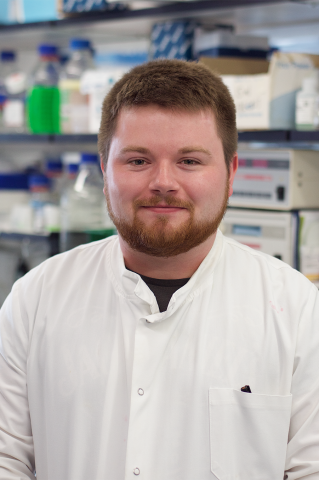
The concerted action of several protein kinases helps orchestrate the error-free transition through a mammalian cell division cycle. Although some prominent players such as cyclin-dependent kinases, polo-like kinases, and Aurora kinases have dominated the cell division limelight for decades, it is increasingly apparent that these kinase families alone cannot account for the extent of protein phosphorylation that has been reported during mammalian mitosis. Yet, the identity and precise roles of additional kinases during cell division cycle has remained undefined.
Research undertaken in the Sapkota lab, together with collaborators in the Maxwell lab (University of British Columbia), has now identified a key role for the serine/threonine protein kinase CK1a in the regulation of mitosis, a stage in cell cycle when duplicated chromosomes segregate. Led by Luke Fulcher, a PhD student in the Sapkota lab, the team discovered that the poorly-characterised FAM83D protein acts to deliver CK1a to the mitotic spindle apparatus, which is a microtubule-based structure that captures and orientates the chromosomes during cell division. The activity of CK1a at the mitotic spindle ensures proper spindle orientation and error-free progression of cell division cycle. Cells devoid of FAM83D, or those harbouring FAM83D mutations that render FAM83D unable to bind CK1a, fail to recruit CK1a to the mitotic spindle, and display spindle orientation defects and a delay in the progression of cell division cycle.
Accurate positioning of the mitotic spindle is critical in both development and for the maintenance of healthy tissues in adults, and dysfunctional spindle positioning is associated with tumorigenesis and cancer. Thus, identifying FAM83D:CK1a as a critical regulator of cell division cycle suggests that targeting the FAM83D:CK1a interaction may be a useful intervention strategy to target cell division in cancer.
The findings are published in the current issue of EMBO Reports, which can be found here.
The lead author, Luke Fulcher, said: “It was a pleasure to work on such an interesting project over the past three years. Learning about mitosis and helping to further the understanding of the phosphorylation-mediated control of cell division has been a highlight of my doctoral studies. I’d like to thank everyone who I have worked with during the course of this project, who have made invaluable contributions to the progress of this research”.
Dr. Gopal Sapkota, who led this research, said “This work was a tremendous team effort and further cements our earlier discoveries (https://www.embopress.org/doi/10.15252/embr.201744807; https://stke.sciencemag.org/content/11/531/eaao2341.full) of how individual FAM83 proteins act as master regulators of CK1 family of serine/threonine protein kinases, thereby helping streamline multiple biological processes that these kinases are known to control. This work not only unequivocally places CK1a at the mitotic spindle for proper spindle alignment and smooth progression of the mammalian cell division cycle but also provides the molecular mechanism through which FAM83D delivers CK1a there.”
Zhengcheng He & Lin Mei (Maxwell Lab; Canada), Thomas Macartney, Nicola T Wood, Joby Varghese, Robert Gourlay, Alan R Prescott, Arlene J Whigham, Graeme Ball, Rosemary Clarke, David Campbell (Dundee) also made important contributions to this study.
Prof. Dario Alessi, director of the MRC-PPU, said, “I congratulate Luke Fulcher and the rest of the team for this terrific paper - I have often wondered how the small CK1 enzyme can play such dominant roles in biology, including controlling the cell cycle. This paper goes a long way towards explaining this mystery, revealing the importance of FAM83 proteins as master regulators of CK1.”

